
Adaptive farming is a holistic approach to agriculture. This practice is employed keeping in mind unforeseen circumstances. It involves adapting farming systems to changing environmental conditions, such as climate variability and extreme weather events.
What are the Key Principles of Adaptive Farming?
Biodiversity: Promoting crop and livestock diversity enhances resilience and reduces vulnerability to pests and diseases.
Soil Health: Maintaining and improving soil quality through practices like cover cropping, crop rotation, and organic matter addition.
Water Conservation: Efficiently managing water resources to minimize waste and ensure adequate supply.
Climate-Smart Practices: Employing techniques that mitigate climate change, such as carbon sequestration and reduced greenhouse gas emissions.
Why is Adaptive Farming Important for India?
India's agricultural sector faces numerous challenges due to climate change, including:
Rising Temperatures: Increased temperatures can lead to crop stress, reduced yields, and shifts in planting seasons. India has seen one of the hottest summers in 2024. The heatwave situation has been concerning.
Erratic Rainfall Patterns: Unpredictable rainfall can result in droughts and floods, affecting crop growth and productivity. June saw a rainfall deficit, leading to increased crop and vegetable prices.
Pest and Disease Outbreaks: Changing climatic conditions can favor the proliferation of pests and diseases, damaging crops and reducing yields.
What Challenges can be Mitigated through this Method?
Enhancing Resilience: Building more resilient agricultural systems that can withstand climate shocks.
Improving Food Security: Ensuring a stable food supply for a growing population.
Protecting the Environment: Conserving natural resources and reducing the negative impacts of agriculture on the environment.
Key Adaptive Farming Practices for India:
Indian farmers can implement various adaptive farming practices to address the challenges posed by climate change:
Organic and Natural Farming: Promoting soil health, biodiversity, and ecosystem services.
Agroforestry: Integrating trees with crops improves soil fertility, reduces erosion, and provides shade.
Water Harvesting: Capturing rainwater for irrigation and livestock needs.
Precision Agriculture: Using technology to optimize resource use and improve yields.
Climate-Smart Varieties: Cultivating crop varieties that are tolerant to heat, drought, and pests.
Indian farmers can build more resilient and sustainable agricultural systems through adaptive practices. This will ensure food security and improve the quality of life for the farmers. Farmers suffer the most due to unprecedented conditions. Policymakers, researchers, and farmers must collaborate and promote these practices to safeguard India's agricultural future.











